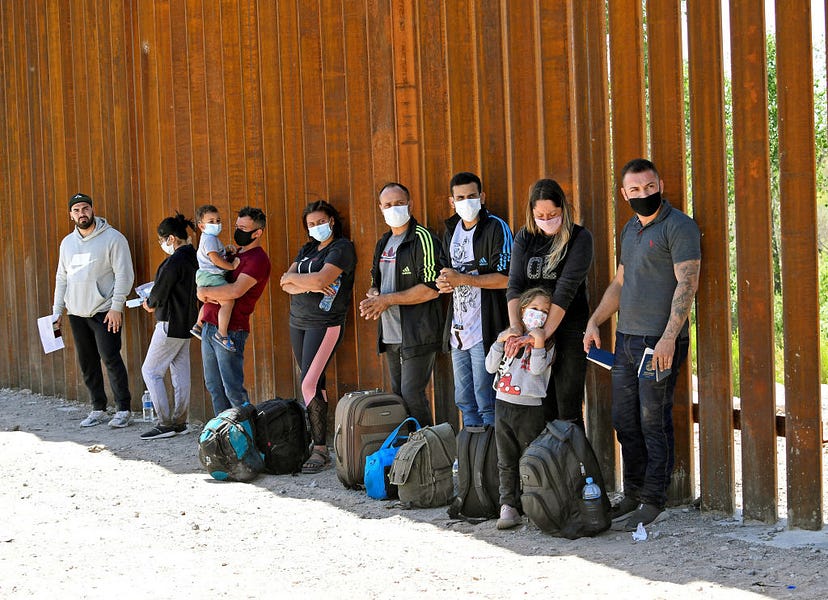WASHINGTON—Attempted migration at the U.S.-Mexico border is typically higher in the spring than other times of the year. But border apprehensions in the last three months have gone beyond the seasonal crush, reaching a 15-year high that has placed stress on the system and tested the Biden administration. In March, U.S. Customs and Border Patrol agents encountered 171,000 migrants, a number that ticked up to 180,000 by May, according to Department of Homeland Security data. A record 18,960 unaccompanied minors attempted to cross the border in March, and while the number has decreased slightly since, shelters are overcrowded and ill-equipped to meet children’s needs.
The Biden administration has called the border situation a “challenge,” while critics have called it a “crisis.” Either way, the chances of an immigration reform package clearing both chambers of Congress this summer seem to be waning despite ongoing bipartisan talks on the Hill and efforts from lawmakers on both sides of the aisle to craft consensus bills.
The biggest impediment to immigration reform, some lawmakers say, is the border. The numbers of asylum-seekers ticked up steadily when the Biden administration took office, perhaps unsurprising after his numerous campaign pledges to carve out a “fair and humane” approach to immigration by ending practices such as forcing asylum-seekers to wait in Mexico and holding kids in detention facilities.
On his first day in office, President Joe Biden announced a pause on construction of the border wall, something Republicans have pointed to as exacerbating the flow of migrants.
During the last three months of 2020, the number of people apprehended by Border Patrol hovered around 72,000 each month. In January, it increased to more than 78,000 and has risen steadily since. David Bier, a research fellow with a focus on immigration at the Cato Institute, told The Dispatch that the number of apprehensions are likely inflated due to repeat crossers.
At the start of the COVID-19 pandemic in March 2020, Trump invoked an emergency health declaration, Section 256 of Title 42, that allowed Border Patrol to return migrants to Mexico without considering asylum requests.
When Biden took office, many thought he would reverse course.
“Lots of people showed up when Biden was inaugurated thinking that the policy would change,” Bier said.
Biden did suspend new construction on the border wall (though some already paid-for construction has continued), revoke Trump’s travel bans, and establish a Family Reunification Task Force to seek to reunite children who remain separated from their families, among other measures. But he did not back away from all the immigration measures implemented by his predecessor. Notably, he kept Title 42 in place and the policy of still expelling migrants due to the coronavirus pandemic.
Biden has proposed the U.S. Citizenship Act, a sweeping plan to set approximately 11 million illegal immigrants on the path to citizenship. The proposal also calls for addressing the backlogs facing the legal immigration system. There are currently more than 1.3 million people awaiting decisions from immigration judges over whether they can remain in the United States, according to Syracuse University’s Transactional Records Access Clearinghouse, a database focused on immigration.
But immigration advocates say something comprehensive is unlikely to pass.
“A change in dynamic this year is [that there is] a growing understanding that incremental reform is probably the way to go,” Danilo Zak, a senior policy advisor for National Immigration Reform told The Dispatch. Zak said he believes there is more political willpower to start with smaller pieces that can garner bipartisanship.
A smaller bipartisan group, led by Senate Majority Whip Dick Durbin, an Illinois Democrat, has met weekly in hopes of reaching consensus.
“They’ve been very constructive,” Maine Republican Sen. Susan Collins, a member of the group, told The Dispatch.
So far, the senators are focusing their efforts on something smaller than Biden’s plan.
The group is considering three main bills. Two have already passed the House: One would offer a path to citizenship for as many as 2.3 million people brought to the United States illegally as children and another population of immigrants that have temporary protected status to stay in the United States. The other House-passed bill would create a path to citizenship for farmworkers. The group is also considering a border security proposal from Sen. Kyrsten Sinema, an Arizona Democrat, and Texas Republican Sen. John Cornyn that would, among other provisions, send more resources to the border.
“The dynamic favors a piece-by-piece approach,” Connecticut Democratic Sen. Richard Blumenthal said. “And I think that path offers some real promise.”
Lawmakers are trying to build support for other bipartisan proposals related to immigration as well: One would recapture unused visas to bring more nurses and physicians to the United States, one would make it easier for family members of legal immigrants to visit their relatives, and another would allocate more visas to Afghan nationals who aided the U.S. military during the war in Afghanistan.
Adding pressure to the talks is a legal challenge to the Deferred Action for Childhood Arrivals (DACA) program that former President Barack Obama created in 2012 via an executive memorandum. A federal judge in Texas is currently considering a court challenge that would strike down the program over questions about its constitutionality. The decision could mean DACA recipients would be deported back to their countries of origin. Legal challenges to the DACA program are nothing new—in response to one challenge, the Supreme Court a year ago chose to leave the program in place. The justices urged Congress to carve out a more permanent legislative solution, but lawmakers have been unable to find common ground.
To mark the ninth anniversary of DACA’s creation, the Senate Judiciary Committee held a hearing Tuesday where members heard from DACA recipients, as well as former Trump and Obama officials. The hearing revealed the daylight that remains between Republicans and Democrats on the issue. GOP members of the committee largely focused on the dysfunction at the southern border while Democrats argued it is long past time for Congress to resolve Dreamers’ legal limbo.
But time is just what Congress is short on. Immigration reform is competing with a host of other policy priorities such as infrastructure and voting reform. June is rapidly drawing to an end, and both chambers will be in session only for a couple weeks of July. Then comes the August recess. So far, other priorities seem to be taking precedence on Capitol Hill and in the White House.
“Fall is more likely, much as I would prefer doing something before the August recess,” Blumenthal, told The Dispatch Monday. “Once we get beyond infrastructure—the immediate demands of infrastructure and perhaps voting rights—sometime this year there’s going to be a moment of opportunity.”
Elizabeth Neumann, a former Department of Homeland Security counterterrorism official, expressed concerns that if lawmakers wait until later in the year, primary season will swamp any chance of passing legislation: “It almost becomes impossible to do anything,” she said.
Republicans are emphasizing their priorities, with some pointing to the influx of migrants at the border as something that will stymie immigration legislation.
“Until there’s something done at the border, I don’t think you’ll have any immigration [reform,]” Iowa Republican Sen. Chuck Grassley told The Dispatch.
“The house is on fire and we’re discussing new tires for the firetruck,” Sen. John Kennedy, a Louisiana Republican, said of border security. “Now, it’s important that firetrucks have good tires. But in the meantime, we’re not going to make any progress on designing a sensible, rational immigration system until we solve the crisis at the border. And only President Biden can do that.”
If bipartisan talks don’t lead to a breakthrough, Democrats may shift gears to another strategy: Trying to pass something on a party-line basis using the budget reconciliation process.
Reconciliation would allow Democrats to advance legislation without winning support from Republicans in the Senate. Democrats used the process to approve their massive coronavirus relief package earlier this year, and they are laying the groundwork now to build another reconciliation vehicle that could advance some of Biden’s sweeping social investments, including child care provisions and free community college.
Lawmakers and activists have called for Democratic leaders to incorporate immigration measures in such a package, noting that making a pathway to citizenship for millions of people would have effects on the federal budget as is required of reconciliation measures. Still, whether all of the immigration priorities Democrats hope to pass would survive the Senate parliamentarian’s scrutiny is unclear.
“Anytime there’s been a CBO examination on immigration reform, it produces a significant increase in the GDP without really costing much money,” Sen. Tim Kaine, a Virginia Democrat, told Insider on Wednesday, referring to the nonpartisan Congressional Budget Office. He suggested immigration measures could boost the economy and federal tax revenue, offsetting the cost of some of the other provisions in the larger package.
“That may not be a traditional pay-for, but if we feel like there’s something we could do within a reconciliation vehicle that could produce significant economic growth… that could be a very legitimate way to look at trying to find a balanced package,” Kaine said.
Durbin, who is leading the bipartisan talks, said leaders are keeping their options open.
“We’re working on two approaches. One approach is direct negotiation with Republicans. That’s underway, it’s been going on for weeks…I hope it will lead to a bipartisan bill,” Durbin told The Dispatch. “Whether it does or doesn’t, there’s still reconciliation as an option until the parliamentarian rules in one way or the other. We’re entertaining the possibility.”









Please note that we at The Dispatch hold ourselves, our work, and our commenters to a higher standard than other places on the internet. We welcome comments that foster genuine debate or discussion—including comments critical of us or our work—but responses that include ad hominem attacks on fellow Dispatch members or are intended to stoke fear and anger may be moderated.